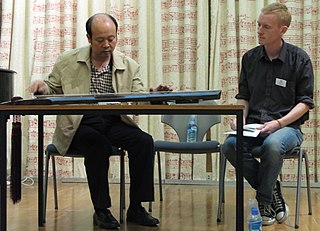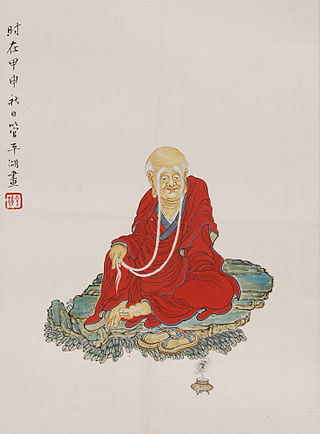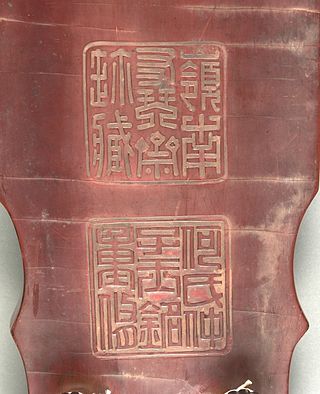Related Research Articles

The guqin is a plucked seven-string Chinese musical instrument. It has been played since ancient times, and has traditionally been favoured by scholars and literati as an instrument of great subtlety and refinement, as highlighted by the quote "a gentleman does not part with his qin or se without good reason," as well as being associated with the ancient Chinese philosopher Confucius. It is sometimes referred to by the Chinese as "the father of Chinese music" or "the instrument of the sages". The guqin is not to be confused with the guzheng, another Chinese long stringed instrument also without frets, but with moveable bridges under each string.

The se or guse is an ancient plucked zither of Chinese origin. It varied in size and construction, but generally had 25–50 strings with moveable bridges and a range of up to five octaves. It was one of the most important stringed instruments in China, along with the guqin. The se gradually faded out of use, having evolved into the similar zheng. Modern versions of the se often resemble the zheng, and attempts have been made to revive the instrument.
The four arts, or the four arts of the Chinese scholar, were the four main academic and artistic talents required of the aristocratic ancient Chinese scholar-gentleman. They were the mastery of the qin, qi, shu and hua, and are also referred to by listing all four: 琴棋書畫; qínqíshūhuà.

Zha Fuxi, also known as Zha Yiping (查夷平) was a leading player and scholar of the guqin. Born in Jiangxi, he started learning guqin in his childhood. In 1936, he co-founded the Jinyu Qin Society (今虞琴社) which later became one of the major national musical organizations for the guqin.

Zeng Chengwei (曾成偉) is a Chinese musician of the guqin, born in the Sichuan province of China. He is a fifth-generation transmitter of the Shu school of qin music, having studied with his maternal grandfather, Yu Shaoze. Zeng is also a well-known maker of the instrument.

Guan Pinghu, was a leading player of the guqin (古琴), a Chinese 7-string bridgeless zither. Born in Suzhou, Jiangsu, Guan came from an artistic family, and started to learn the guqin from his father, Guan Nianci. After the death of his father when he was thirteen, Guan continued with his father's friend Ye Shimeng and Zhang Xiangtao. He also studied with the leading players of three different schools; Yang Zongji (1865–1933), the leading player in Beijing, the Daoist Qin Heming, and the Buddhist monk Wucheng.
The notation of the guqin is a unique form of tablature for the Chinese musical instrument, with a history of over 1,500 years, still in use today.
The North American Guqin Association is a guqin society based in the State of California, in the United States, which serves guqin players on the West Coast of the United States. Of the three major qin societies of the West, this society was the world's largest English speaking online community for the guqin and has the most connections and scope of activities.
The London Youlan Qin Society is a London-based qin society serving guqin players in the UK. Of the three major qin societies of the West, this society was the most informal but still the most active in terms of regular events and yajis.
Lin Youren was a noted player of the Chinese musical instrument guqin. He was famous for his unaffected playing style. Lin also taught guqin at the Shanghai Conservatory of Music.
The history of the guqin, an ancient Chinese musical instrument, is a long one that spans 3,000 years. Although similar, it should not be confused with another Chinese zither instrument, the guzheng, which has bridges.
The construction of the guqin Chinese zither is a complex process like any other musical instrument. However, there is much symbolism in the choice of materials, the shape or form of the instrument that are important things to consider when creating a qin.
The strings of the guqin Chinese zither are either made of silk, nylon or metal-nylon.

There are many different tunings for the guqin.

The guqin is a Chinese musical instrument with a long history of being played since ancient times. When the guqin is played, a number of aesthetic elements are involved.
The New York Qin Society is a guqin society based in New York, New York in America, serving guqin players on the East Coast of the United States. Of the three major qin societies in the West, this society is the most formally structured with a formal agreement of rules and a more learned society approach to selecting members.

Systems of musical notation have been in use in China for over two thousand years. Different systems have been used to record music for bells and for the Guqin stringed instrument. More recently a system of numbered notes (Jianpu) has been used, with resemblances to Western notations.

The Shu School of Qin Music (蜀派古琴) refers to the modern guqin regional performance style tradition and lineage begun in the mid-19th century by its founder, Zhang Kongshan. The "Shu" name derives from the main base of operations at the time, namely the Sichuan region of China. Today, the Shu School has many branches and lineages, most of which trace their foundation to Zhang Kongshan, though the term is equally applied to Sichuan-based players in general.
Yu Shuishan is one of the master contemporary guqin players and contributors. He is a Professor of Architecture in the College of Arts, Media and Design at the Northeastern University, a fourth generation Mei’an School guqin player, and the founder of North America Mei'an Society (北美梅庵琴社).
References
This article has an unclear citation style .(August 2016) |
- Please see: References section in the guqin article for a full list of references used in all qin related articles.